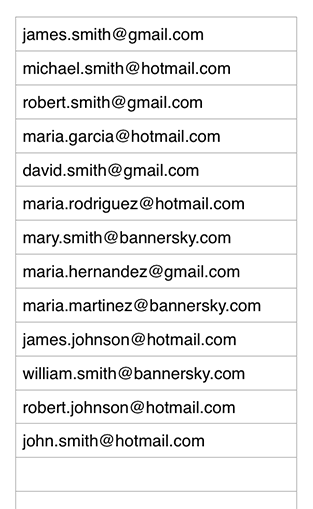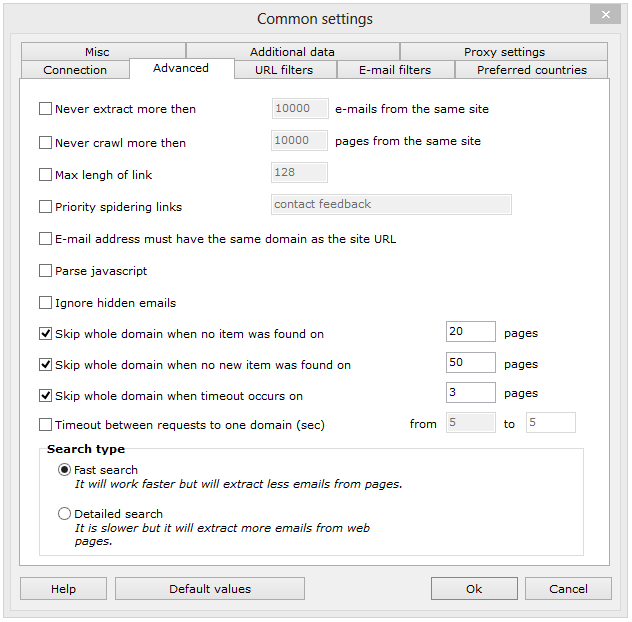Pro Ideas To Choosing An Email List Site
Pro Ideas To Choosing An Email List Site
Blog Article
What Should I Think About When Purchasing Cpa Email Lists?
Consider these factors when buying a CPA list (Certified Public Accountant). You want to ensure you get a list that is current high-quality, and in compliance with legal guidelines. What you should consider is:1. Data Quality and Accuracy
Source of Data: Check whether the information is genuine. The most reliable suppliers typically gather information from sources like directories of professional, databases as well as trade associations. Avoid lists created using scraping and unreliable methods as they may contain inaccurate or outdated information.
Verification: Ensure that the email address list has been recently verified. This can reduce bounce rates and also ensures that you are reaching active email addresses that are valid and current. Ask how often this list is cleaned and updated as CPAs may frequently change firms or even jobs.
Segmentation: A great CPA database will offer segmentation options. These include locations (city or state) and industry-specific specializations (e.g. auditing and financial planning, taxation) and years of experience, and firm size. This will help you improve the effectiveness and relevance of your campaigns.
2. Legal Regulations
Data Privacy Laws Ensure that your email list complies any local laws and regulations, such as California Consumer Privacy Act, General Data Protection Regulation or General Data Protection Regulation. Email addresses must be obtained legally with the approval of all participants.
Compliance with CAN SPAM Act: To ensure that U.S. campaigns comply with CAN SPAM Act, which regulates commercial email communication, the list needs to be compliant. The list should provide opt-out methods and avoid misleading subjects or content. Failure to comply can result in fines as well as other legal issues.
Opt In Consent: Make sure you've obtained the email address through an opt in consent. It is a sign that recipients who have signed a consent form agree to be targeted by marketing from third parties. This decreases the likelihood of complaints about spam and improves engagement.
3. Provider Reputation
Reputable Provider: Examine the reputation of the company thoroughly. Read reviews, testimonials from customers and reviews to gain a sense about what customers who have used the service previously had to say about their experience. Established providers with proven record of success have a higher likelihood to provide accurate and high-quality information.
Transparency. The provider should make it clear when and how the data is changed. If the service provider isn't able to clearly explain their method, this should raise flags of red.
Customer Support - If looking for help with customization of lists, troubleshooting issues or compliance rules, then an experienced support team is vital. A good customer support service can save you time and money during your campaign.
4. Cost and Return on Investment
Pricing Models. Different service providers offer different pricing structures. Certain charge per contact and others have a flat-fee or a subscription. Check the price against the expected return on investment and then evaluate your price against the value of your selection.
Ask about refund policies. In the case of a large number incorrect or invalid email addresses, a majority of service providers offer a replacement or refund policy. A guarantee can give peace of mind.
Cost vs. Quality: Don't solely focus on price. It's tempting to purchase a lower-cost list, however if its quality is poor this could lead to low participation and high bounce rates. Spend money on lists that provide value in terms of data precision and segmentation.
5. Ownership and Usage of Data
Single-Use and Multiple-Use. Multiple-Use: Make sure you know if you're purchasing the list only for a single use or if you own the data and are able to use it in ongoing campaigns. A list that you own can be more flexible for longer-term campaigns, but single-use lists cost less.
Exclusive vs. Shared lists: Check if your email list is only for the buyer or if others can also access it. Shared lists can cause people becoming tired of the list if they have been bombarded with marketing emails from other companies.
6. Data Integration and Format
CRM Compatibility: Make sure that the list of contacts is provided to you in a format compatible with CRM, email marketing software or other software. The data can easily be transferred and managed.
Easy to Use What is the simplest way to have the data be segmented or controlled once they have been integrated into your systems? A well-organized database will improve the effectiveness of targeting and personalization.
7. Ethical Questions
Relevance of Content - CPAs have a busy schedule, so it's crucial to provide content that's relevant and provides value. Avoid sending irrelevant messages that could damage your reputation or lead to more spam complaints.
Avoid sending too many email messages Limit the number occasions you send your contacts an email. Insufficient communication could lead to complaints about spam and unsubscribes that can damage your sender's reputation.
You can conclude your conclusion by clicking on the hyperlink below.
Make sure you consider the quality of data legal compliance, as well as the reputation of the company when you purchase CPA lists. Consider legal compliance, data quality, and reputation of the provider when purchasing a CPA list to make sure your investment is worth it. Effective segmentation and ethical methods will increase engagement and return on investment and help maintain a positive image of your company. Take a look at the recommended cpa email list for website recommendations.
When You Are Buying An Oil Industry-Related Email Database, There Are 10 Essential Points To Be Aware Of.
When buying an email list to be used in the gas and oil industry, it's important to consider several factors to ensure the list is high-quality, targeted and legally in compliance. Here are 10 essential things to keep in mind:
1. Relevance of target audience
Ensure that the email list targets only the natural gas and oil industry. Lists should be segmented to include professionals like engineers, geologists and managers of operations in the middlestream, upstream and downstream.
Roles and Job Titles - Look for a list of the top people in your company (executives/managers, engineers, etc.). in the company you want to target.
2. List the source and vendor reputation
Reputable Providers: Purchase from reputable and trusted email list providers who follow the best practices for the collection of data. Avoid sources of doubtful origins because they could lead to unreliable data or legal problems.
Data Quality: Read the reviews or testimonials about the service to evaluate the reliability and quality.
3. Freshness and Accuracy of Data
Data Age: This list should contain the most current contact details. The staff of oil and gas companies is continuously shifting, which can lead to outdated contact information.
Verification Process. Make sure that vendors are regularly checking and amend their lists to get rid of incorrect or inactive contact details.
4. Conformity to Regulations
Legal Compliance: Make sure that the list of users is in compliance with local and global regulations such as GDPR, Can-SPAM and other which govern the usage of personal information. Infractions could result in legal penalties and risks.
Opt-in process: Make sure that the email addresses have been collected correctly, which means they have given their consent to receive messages.
5. Segmentation and Customization
Custom Segmentation: Quality list providers should offer the option of segmentation based on things such as location, job title, company size or sub-sector in the oil and gas industry.
Custom Filters based on the goals for your campaign that you're aiming for, ensure that your list is customized to meet criteria such as geographic location, size of business, or other specific needs.
6. Deliverability Rate
High Deliverability Rates: A high-quality email list must have high deliverability rates generally 95% or higher. The bounce rates for low-quality email lists could be very high, which can harm your reputation and affect marketing efforts.
Test and Metrics - Ask for metrics that can measure the effectiveness of your list.
7. Volume vs. Qualitative
Quality over Quantity: Make sure that your list isn't just big in terms of size, but also accurate and highly targeted. A shorter, more precise list can produce better results than a large list that is generic.
Engagement Metrics Prioritize engagement metrics above contacts. A receptive audience is more likely to respond.
8. Cost Structure and Pricing
Transparent Pricing is transparent. Know the structure of pricing. Be wary of lists that are very low in price, as they might not be of high-quality or provide any worth.
Return on investment: Compare the price of the list to the conversion rate expected to determine the ROI. It's sometimes more cost effective to pay more for a list with high conversion rates.
9. Privacy of data and security
Data Protection: Make sure that the list provider has robust data security practices in place. The list provider should ensure that all information on the customer's account is secure from unauthorized access.
Confidentiality. Make sure that the service will not share or sell your data. Particularly, if your business needs discretion and confidentiality.
10. After-sales Customer Support
Customer Support: The seller should provide ongoing assistance to customers in the event that they have issues with their list or need assistance in implementing.
List Replacement Guarantee: In case there are issues with the list (e.g., incorrect information or insufficient delivery) A reputable service will provide either a refund or replacement.
These factors will help you to choose an email list for the oil and gasoline industry that is efficient and compliant. It should also align with your business goals. Take a look at the top rated oil and gas industry email list for more examples.